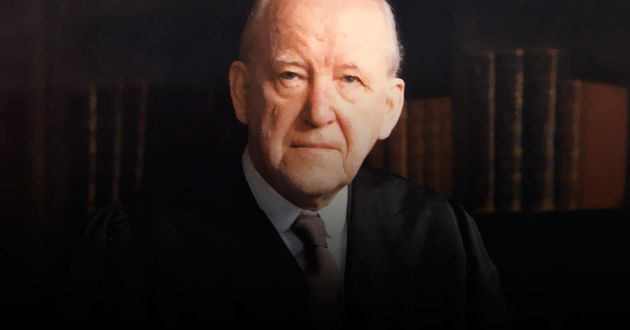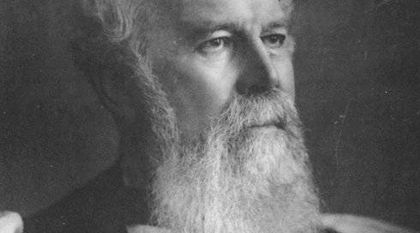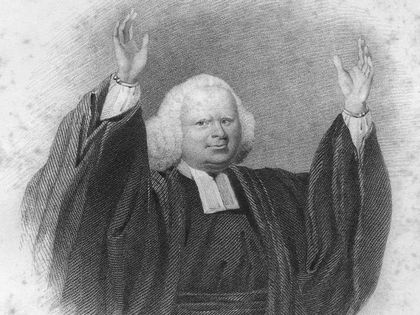The leading Welsh preacher shares thirteen characteristics regarding true evangelicals.
 Dr. Martyn Lloyd-Jones.
Dr. Martyn Lloyd-Jones.
Dr. Martyn Lloyd-Jones (MLJ) is perhaps best-known as Britain’s leading biblical expositor throughout the twentieth century.
Today we are going to hone in upon the second of his three addresses at the 1971 International Fellowship of Evangelical Students (IFES) Conference in which he outlined thirteen key characteristics of evangelicals.
1.- An evangelical is Bible-centred
Evangelicals are committed to the supreme authority of Scripture in all questions of doctrine and conduct. They too, like John Wesley, are men “of one book”.
As MLJ put it, “He is a man of one book; he starts with it; he submits himself to it; that is his authority. He does not start from any extra-biblical authority. He confines himself and submits himself completely to the teaching of the Bible”.
2.- An evangelical uses the term as a prefix and not as a suffix
An evangelical is not first and foremost a Baptist evangelical or a Presbyterian evangelical or an Episcopalian evangelical, but an evangelical Baptist or an evangelical Presbyterian or an evangelical Episcopalian.
In other words, his denominational affiliation is always secondary and subject to the evangelical cause.
3.- An evangelical is watchful
In obedience to the clear commands of Scripture to be watchful (Matthew 26:41; Acts 20:28-29; 1 Corinthians 16:13-14; Ephesians 6:12; 1 Timothy 6:3-4; 1 John 2:20, etc.), evangelicals are careful about the doctrine they hear.
“When a man ceases to be watchful, he, to that extent, ceases to be an evangelical. The person who says, It is all right; you need not bother; we are all Christians and having a marvellous time together –and is not watchful, is already departing from the biblical position”.
4.- An evangelical distrusts reason
Ever since the days of Tertullian, evangelicals have been suspicious of philosophical systems based upon the insights of human wisdom. It was the exaltation of reason that led to the great dispute between Luther and the Aristotelian nature of Roman Catholicism.
It also separated the Puritans from the official Church of England. Evangelicalism depends upon the revelation of God, not the hunches of “that old witch, Lady Reason” (Luther).
 A young Martin Luther quipped: My theology is getting on and is dominant in the university. God has done it. Aristotle is going downhill and perhaps he will go all the way down to hell.
A young Martin Luther quipped: My theology is getting on and is dominant in the university. God has done it. Aristotle is going downhill and perhaps he will go all the way down to hell.MLJ blamed the early Christian apologists who, although noble in their intention, ultimately led to the institutionalization of the church by wedding Greek philosophy to the Christian Gospel.
He warned the students present at the conference about the world of scholarship, urging them to use reason as a servant and not as a master.
“It is when men begin to bow the knee to scholarship, submit themselves to it, and to regard it as the ultimate authority, that I suggest they have sold the pass and ceased to be truly evangelical”.
He also pointed out that the real damage done to the church over the previous two hundred years had stemmed from the theological seminaries. Evangelicals, therefore, must always keep their wits about them and refuse to be overawed by the musings of human reason and scholarship.
5.- An evangelical has a ‘low view’ of the sacraments
Although MLJ does not develop this idea of the sacraments (baptism and the Lord’s Supper) in his second address, he does touch upon it in the third one by pointing out that evangelicals reject any kind of sacerdotalism associated with the ordinances.
“There is no efficacy inherent in the sacramental act itself. A sacrament is nothing unless there is in the recipient belief. We do not believe in the sheer unqualified efficacy of sacraments”.
The Welshman thus rejected any notion of baptismal regeneration or sacrificial element present at the Lord’s Table as anti-evangelical to the core.
6.- An evangelical takes a critical view of history and tradition
Evangelicals generally feel uncomfortable with religious institutionalism. Whereas Roman Catholics emphasize the principle of continuity, evangelicals are more interested in discontinuity.
They do not glory in institutions and they are chiefly concerned to see their denominations brought into line with the Word of God. Evangelicals, therefore, take a critical stance with respect to history and tradition as they are committed to Sola Scriptura.
7.- An evangelical acts upon his beliefs
Luther, Calvin and Knox were three men who acted. Hence they were thoroughly evangelical. The Protestant trio did not revel in theology as a mere academic discipline but it had a direct impact upon their life.
The evangelical family not only has deep biblical convictions, but he also acts upon them because the Spirit of God is within. He is ready to change his beliefs and conduct when the Word of God demands him to do so.
8.- An evangelical simplifies everything
In stark contrast to the Aristotelian framework of Roman Catholicism and the anthropocentric philosophies at work in liberal theology, evangelicals are simple folk who seek to make the truth of Scripture plain for all to see.
Evangelicals aspire after simplicity, not only in doctrine and preaching, but also in church order, church government, church liturgy, ministerial dress and even church architecture. There is something about the evangelical spirit that is innately anti-elaborate. It takes great joy in simplicity.
As J.C. Ryle had written of the great evangelical eighteenth-century revivalists, “They preached simply. They rightly concluded that the very first qualification to be aimed at in a sermon is to be understood. [...] They strove to come down to the level of the people, and to speak what the poor could understand. To attain this they were not ashamed to crucify their style, and to sacrifice their reputation for learning”.1
 J.C. Ryle was the leading evangelical Anglican of the nineteenth-century. He was a great admirer of his acclaimed Baptist contemporary, Charles Spurgeon.
J.C. Ryle was the leading evangelical Anglican of the nineteenth-century. He was a great admirer of his acclaimed Baptist contemporary, Charles Spurgeon.9.- An evangelical is concerned about the doctrine of the church
Evangelicals are characterized by a passion for a pure church. This explains why Luther left Rome and the Puritans departed from the Church of England.
An evangelical, “is concerned about a pure church. He does not believe in a state church. He is vitally concerned about his correct view of the nature of the Christian church”.
The history of the church bears witness to a constant friction between the institutional church and the church as a simple, yet vital, community of Gospel-believers. Evangelicals long for a truly biblical and Spirit-led church.
10.- An evangelical puts emphasis upon the new birth
Rather than taking delight in “dead orthodoxy” the evangelical is passionate about uniting their biblical teaching with a lively pietistic spirit. Not only does Christianity begin with a powerful work of regeneration (new birth) by the power of the Holy Spirit, but it also produces an invigorating life of faith.
Luther, Calvin, Arndt, Spener, Francke, William Perkins and Jonathan Edwards were all immersed in the revitalizing presence of the Spirit. They had experienced a true new birth and desired to keep the flame blazing.
Therefore prayer is the hallmark of the evangelical people. Without the prayer meeting, evangelicalism perishes.
Furthermore, evangelicals walk in personal holiness, committing their souls and bodies unto the cause of the Lord.
11.- An evangelical is ever interested in revival
Institutional churches, as a general rule, have next to no interest in the grand theme of Christian revival. But evangelicals revel in learning about the great outpourings of the Spirit of God in history. Revivals enthuse and stir up evangelical believers.
The true evangelical, “is always longing for an outpouring of the Spirit, and the great evangelical re-awakenings have always been a result of an effusion of the Holy Spirit. The evangelical by nature is tremendously interested in revival.”
 Lloyd-Jones was greatly interested in the theme of revival and was particularly fond of the ministry of George Whitefield, the great eighteenth-century revivalist.
Lloyd-Jones was greatly interested in the theme of revival and was particularly fond of the ministry of George Whitefield, the great eighteenth-century revivalist.12.- An evangelical gives primacy to preaching
Preaching is the lifeblood of the true evangelical. He can never get enough of preaching. He loves to hear the Word of God expounded and applied.
“To the evangelical, nothing compares with preaching”.
Throughout the centuries, the evangelical faith has taken great joy in the authoritative proclamation of Scripture. Perhaps no other segment of the Christian church has been more uniquely blessed by mighty preachers than the evangelical wing.
13.- An evangelical is always concerned about evangelism
Evangelicals find themselves with a burning desire to reach others for Christ. Since the evangelical has experienced the working of God in his own soul, his sole desire is for others to enjoy the same fullness in Christ.
Consequently, the evangelical is much more than a church-attendant; he is a soul-winner.
The evangelical, “believes in hell, eternal punishment; and he is concerned about those men dying in spiritual darkness round and about him. They become a burden to him, and he is not satisfied until he has done his utmost to bring them to the knowledge of the truth as it is in Christ Jesus”.
Conclusion
So, to sum up what we have learned from “the Doctor” today. A true evangelical:
- Is Bible-centred.
- Gives priority to the evangel over and above his denominational commitments.
- Ever watches.
- Distrusts reason.
- Has a low view of the sacraments.
- Studies history and traditional critically (on the basis of God’s Word).
- Acts upon what he believes.
- Simplifies everything.
- Is concerned about the purity of the church.
- Stresses the new birth and the new life.
- Loves revival.
- Loves preaching.
- Is highly concerned about evangelism.

Las opiniones vertidas por nuestros colaboradores se realizan a nivel personal, pudiendo coincidir o no con la postura de la dirección de Protestante Digital.
Si quieres comentar o